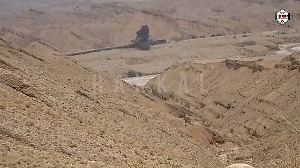Scientists on Friday celebrated 50 years of the country's first nuclear research reactor -- Apsara, which has played a key role in research in areas as diverse as forensic science and the study of lunar and meteorite fragments.
There has been no looking back for the country's atomic programme since Apsara went critical exactly 50 years ago on this day, said Bhabha Atomic Research Centre Director Srikumar Banerjee.
Apsara, a 'swimming pool-type' indigenous reactor that initially used highly enriched uranium from Britain, has played a crucial role in developing several programmes with applications in power, agriculture and health, Banerjee said at the golden jubilee celebrations at BARC in Mumbai.
The reactor is also extensively used by forensic scientists and analytical chemists for studying a wide range of materials, including moon rock samples of the Apollo mission to meteor remnants that fell to earth in Orissa in 2003, he said.
Apsara, which figured in the July 18, 2005 statement on the Indo-US nuclear deal for its fuel core with a foreign origin, will be refurbished after the fuel is removed to a safe place for storage in the next two years. The upgradation will use indigenous low enriched uranium and have many advantages like a seven-fold increase in neutron flux, and the reactor will operate at two MW instead of one MW, Banerjee said.
"Two years back, we wanted to upgrade Apsara and retrofit it for seismic resistance, but a number of experiments like shielding for thorium-based advanced heavy water reactor and fast breeder reactors had to be completed and it will take a couple of years," he added.
The Nuclear Power Corporation of India Limited, which has a goal of generating 40,000 MW by 2020, will continue its research collaboration with BARC, NPCIL Chairman S K Jain said.
The company, with total assets of Rs 28,000 crore and profits of Rs 1500 crore annually, has grown through research and development of nuclear science and technology based on work mostly done with Apsara, Jain said.
"NPCIL has come a long way and it is now ready for global collaboration in a big way. It is also getting ready for four units of indigenous 700 MW plants in the next five-year plan," he said.
Seven nuclear plants -- four pressurised heavy water reactors of 220 MW each, two Russian light water reactors of 1,000 MW each and one fast breeder reactor -- are also being built, jain said. NPCIL is negotiating with its counterparts in France and Russia for getting more plants to reach the target for nuclear power generation.
Nuclear Fuel Complex Chief Executive R N Jayaraj said it had developed the capacity to produce 610 tons of fuel a year needed for PHWRs and planned to enhance this figure to 800 tons a year. NFC currently produces 350 tons of fuel a year.
NFC is also producing non-nuclear materials like stainless steel and other advanced materials, he said.
Meanwhile, Uranium Corporation of India Chairman R Gupta said exploration activities to find uranium were on in full swing in several states, including Meghalaya, Rajasthan, Andhra Pradesh, and few mines will be taken up for construction.






 © 2025
© 2025